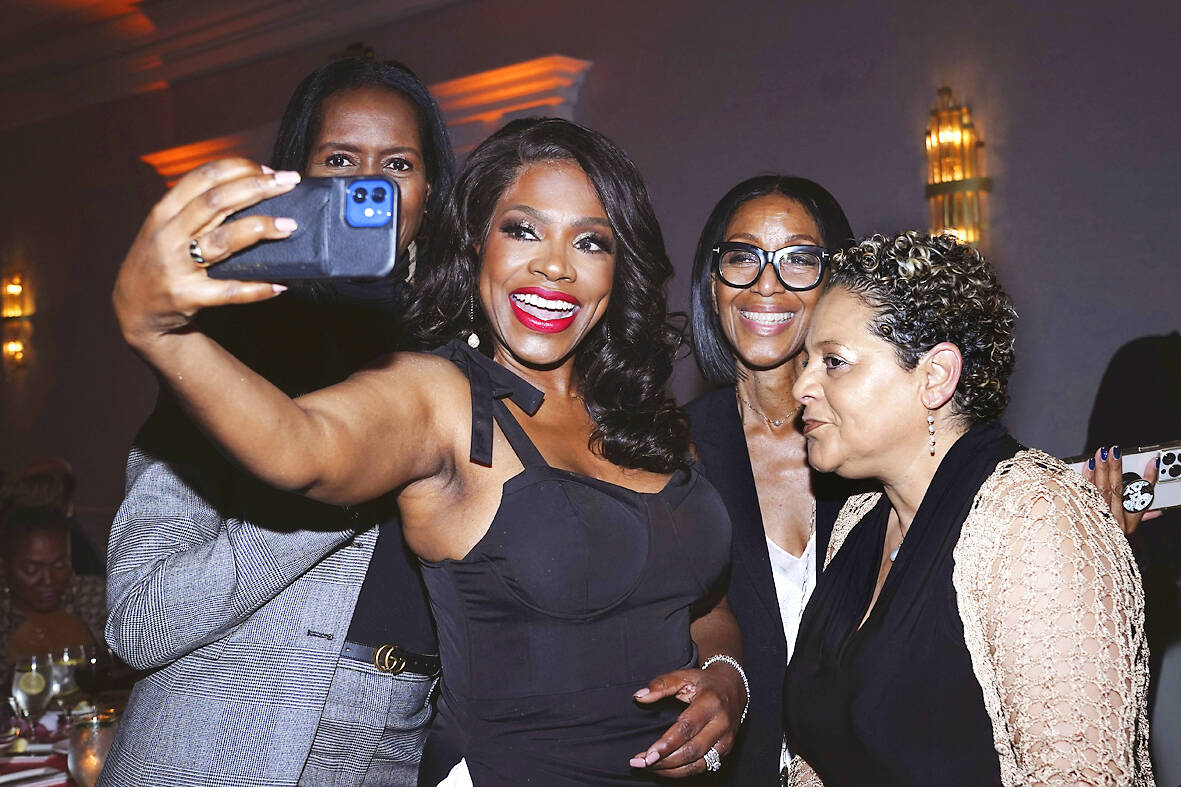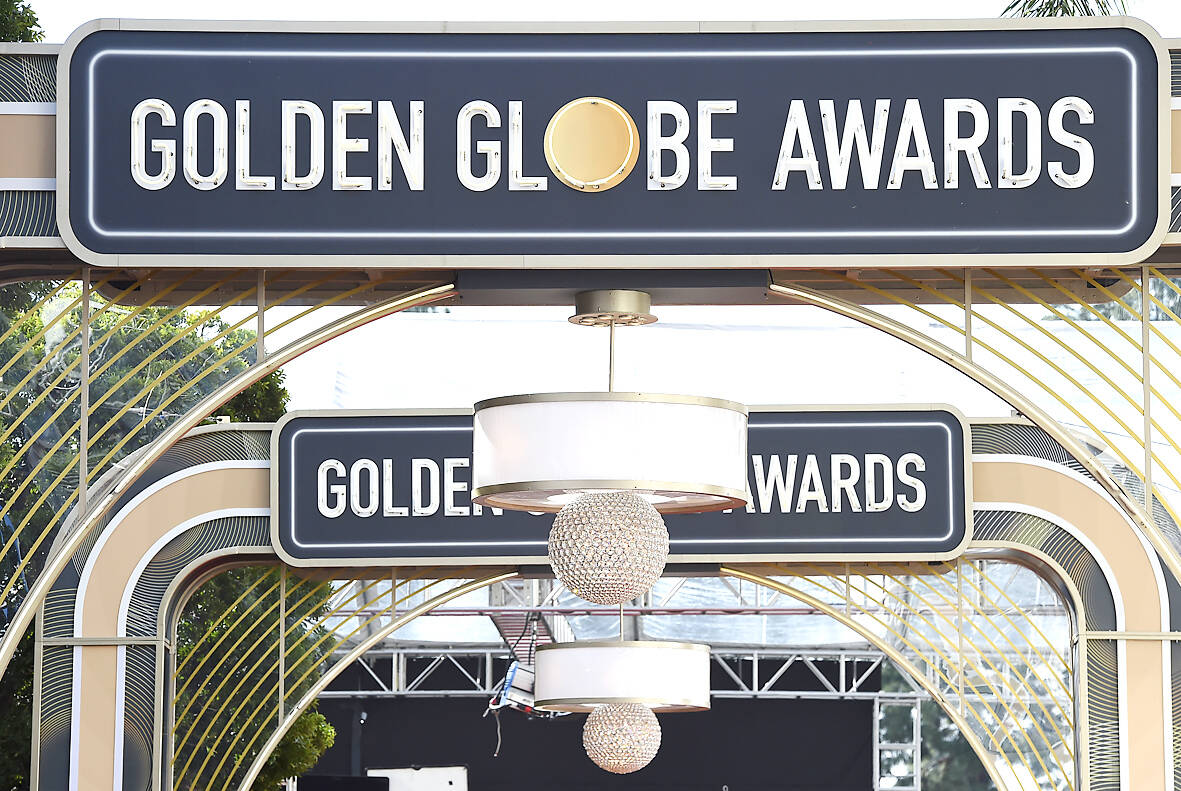Without a TV show, starry red carpet, host, press or even a livestream, the Golden Globe Awards were in chaos last year after scandal broke over lack of diversity, accusations of sexism and ethical and financial lapses among members of the Hollywood Foreign Press Association.
Once known as Hollywood’s biggest, booziest party that regularly drew 18 million television viewers, the doling out of statues was reduced to a 90-minute private event with no celebrities present at the Beverly Hilton Hotel.
Winners were announced on Twitter, often without specifying what project a person had actually won for.

Photo: AP
What a difference a year can make.
After dumping the telecast in the aftermath of a damaging expose by the Los Angeles Times, NBC will put the battered 80-year-old Globes back on the air today under a one-year deal, as opposed to multi-year contracts of the past worth tens of millions of dollars.
REFORMS

Photo: AP
A wave of celebrities plan to attend, along with star presenters and funnyman host Jerrod Carmichael after the embattled controllers of the Globes dug deep into the work of implementing top-down reforms.
There’s now a strict code of conduct, refreshed bylaws, a ban on gifts and new rules on accepting travel and other perks from the industry. Contentious news conferences were dumped, and the pool of awards voters was expanded beyond the 87 Los Angeles-based foreign journalists who once ruled the organization.
But are the powerful publicists, studios and other stakeholders who boycotted in protest satisfied with the changes? And are those changes the beginning — or closer to the end?

Photo: AP
“It’s, by far, not over,” said German journalist Helen Hoehne, who took over as president of the HFPA a year and a half ago. “We always said when we started this journey that it would be ongoing and that it would take some time.”
Kelly Bush Novak, CEO and founder of the A-list public relations firm ID, said more must be done, but she supports steps taken so far.
“We came together ... to ensure the future of the Globes, in step with our culture and our shared values as an industry, and we see commendable and seismic progress,” she said. “I’m optimistic that the work will continue.”
Still, Novak acknowledged not all stakeholders are on board ahead of today’s broadcast, despite sweeping changes aimed at restoring the luster of the Globes.
Last year, publicists like Novak banded together to battle the HFPA, and studios that included Netflix and WarnerMedia cut ties with the organization after the LA Times raised questions about corruption and a range of bias issues over race and sexual orientation.
None of the 87 Hollywood Foreign Press Association members was Black and the group had not had a Black member since at least 2002.
Now, after an effort to increase and diversify its ranks, 199 people decide who gets a Globe, a mix of 96 HFPA members and outsiders from other countries brought in to dilute the power of the old guard. Membership eligibility was expanded from Los Angeles to anywhere in the US.
Heading into the telecast, Globes voters stand at 52 percent female, and 51.8 percent racially and ethnically diverse, including 19.6 percent Latino, 12.1 percent Asian, 10.1 percent Black and 10.1 percent Middle Eastern. Voters also include those who are LGBTQIA+. In all, 62 countries are represented.
The governing board was expanded from nine to 15 and includes three Black members, two of whom vote on rules and other matters but not awards. Overall, the organization now has six Black HFPA members and 14 Black international Globes voters who aren’t members.
Perhaps the most significant change: The Globes were purchased by billionaire Todd Boehly, who also owns Globes producer dick clark productions and the Chelsea soccer team and is an investor in the Beverly Hilton. He’s shifting the voting body from its founding nonprofit status to a for-profit model, pending approval by the California attorney general. He plans to preserve the HFPA’s charitable work with a separate nonprofit entity.
HOTLINE
A hotline managed by two independent law firms was opened, with complaints investigated by outsiders. A chief diversity officer was hired, and mandatory racial, sexual harassment and sexual orientation sensitivity training was put in place, required for any HFPA member casting Globe votes.
Michelle Williams, nominated for her turn in The Fabelmans, is among dozens of stars panning to attend Tuesday.
“It feels to me like the community as a whole has decided that this organization has really done a lot of work to reform themselves and that we can support change, like we can hold people accountable and then we can support them as they continue to journey in their path towards being a better organization,” she said.
Added Judd Hirsch, nominated for the same film: “We’ll be there. We’ll give them another chance.”
Dumping news conferences at the center of insensitive questions posed to talent who felt obligated to show up helped cool off some critics, but not all.
“I can’t speak for everyone. There may be some reluctance to participate,” Novak said. “We must acknowledge the past and will never forget the damage done. Manifesting a new future requires it.”
Brendan Fraser, nominated for his performance in The Whale, will not be there. In 2018, Fraser said he was groped by Philip Berk, a former HFPA president who is from South Africa.
Berk was expelled in 2021 after calling Black Lives Matter “a racist hate movement.”
“I just hope that we can regain his trust over time,” Hoehne said of Fraser.
The same, Hoehne said, goes for Tom Cruise. Last year, he returned his three Golden Globes in protest. With a best picture nod for his long-awaited sequel Top Gun: Maverick, he was snubbed for best actor this year.
PAID EMPLOYEES
Under Boehly’s leadership, HFPA members will earn US$75,000 a year as his employees, as opposed to current stipends closer to US$5,000. They’ll vote on nominations and winners among films and television series submitted for awards consideration. They’ll write for the organization’s Web site, and organize other projects, the LA Times said, citing a confidential employee memo it reviewed.
The 103 new voting non-members recruited with the help of the National Association of Black Journalists, Asian-American Journalists Association and LGBTQIA+ organizations will not be paid, setting up a two-tier structure aimed at eliminating the taint of financial compensation as more new recruits come on board.
Outraged industry stakeholders had called for the overall Globes voting body to be closer to 300. Other reforms are aimed at battling the perception of influence peddling.
As eventual paid employees, members will be subject to firing without cause. They’re now required to sign a code of conduct every year covering job performance, decorum and ethical behavior.
The 80-year-old group had been stuck in its ways, Hoehne acknowledged.
“We needed to question a lot of things. We needed to look at these bylaws and say, OK, how can we make them better? How can we modernize the association? We had never really done it and not addressed it,” she said.
Although the new pay structure has not yet been implemented, over the past year the HFPA has pushed out several members it accused of violating its standards.
One was accused of forging signatures on Internal Revenue Service documents, another case related to sexual harassment and a third involved fabricating interviews that never occurred, according to an HFPA spokesperson.
Boehly himself acknowledged the future is uncertain.
“I have nightmares where it doesn’t work too, you know? I get it, you can’t convince all of the people all of the time of anything,” he told the LA Times. “We know we have to add value and we know that we have to be part of the solution.”

May 26 to June 1 When the Qing Dynasty first took control over many parts of Taiwan in 1684, it roughly continued the Kingdom of Tungning’s administrative borders (see below), setting up one prefecture and three counties. The actual area of control covered today’s Chiayi, Tainan and Kaohsiung. The administrative center was in Taiwan Prefecture, in today’s Tainan. But as Han settlement expanded and due to rebellions and other international incidents, the administrative units became more complex. By the time Taiwan became a province of the Qing in 1887, there were three prefectures, eleven counties, three subprefectures and one directly-administered prefecture, with

It’s an enormous dome of colorful glass, something between the Sistine Chapel and a Marc Chagall fresco. And yet, it’s just a subway station. Formosa Boulevard is the heart of Kaohsiung’s mass transit system. In metro terms, it’s modest: the only transfer station in a network with just two lines. But it’s a landmark nonetheless: a civic space that serves as much more than a point of transit. On a hot Sunday, the corridors and vast halls are filled with a market selling everything from second-hand clothes to toys and house decorations. It’s just one of the many events the station hosts,

Among Thailand’s Chinese Nationalist Party (KMT) villages, a certain rivalry exists between Arunothai, the largest of these villages, and Mae Salong, which is currently the most prosperous. Historically, the rivalry stems from a split in KMT military factions in the early 1960s, which divided command and opium territories after Chiang Kai-shek (蔣介石) cut off open support in 1961 due to international pressure (see part two, “The KMT opium lords of the Golden Triangle,” on May 20). But today this rivalry manifests as a different kind of split, with Arunothai leading a pro-China faction and Mae Salong staunchly aligned to Taiwan.

Two moves show Taichung Mayor Lu Shiow-yen (盧秀燕) is gunning for Chinese Nationalist Party (KMT) party chair and the 2028 presidential election. Technically, these are not yet “officially” official, but by the rules of Taiwan politics, she is now on the dance floor. Earlier this month Lu confirmed in an interview in Japan’s Nikkei that she was considering running for KMT chair. This is not new news, but according to reports from her camp she previously was still considering the case for and against running. By choosing a respected, international news outlet, she declared it to the world. While the outside world